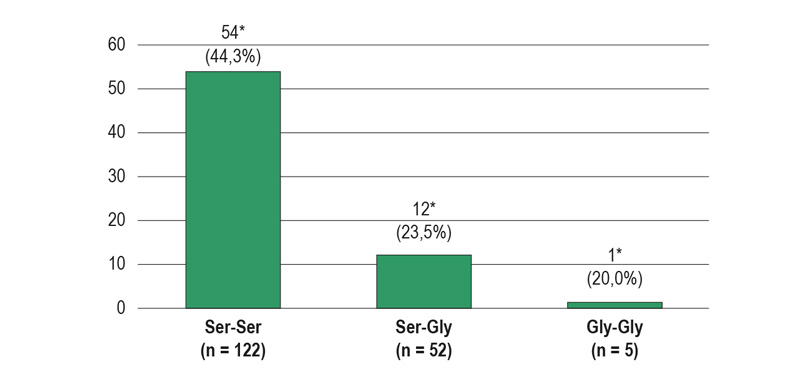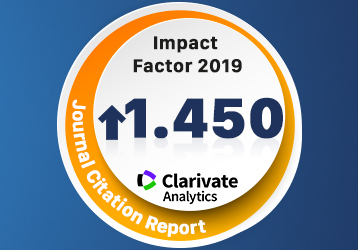Volume 114, Nº 4, April 2020
DOI: https://doi.org/10.36660/abc.20190187
ORIGINAL ARTICLE
Ser49Gly Beta1-Adrenergic Receptor Genetic Polymorphism as a Death Predictor in Brazilian Patients with Heart Failure
Felipe Neves de Albuquerque
Andrea Araujo Brandão
Dayse Aparecida Silva
Ricardo Mourilhe Rocha
Marcelo Imbroinise Bittencourt
Ana Luiza Ferreira Sales
Pedro Pimenta de Mello Spineti
Gustavo Salgado Duque
Lucas Rangel de Souza Azevedo
Roberto Pozzan
Bernardo Rangel Tura
Denilson Campos de Albuquerque

Figure 1 – Distribution of number of deaths according to Ser49Glyβ1 genetic polymorphism. Data were expressed in absolute and relative frequencies. In the comparison of Ser-Ser x Ser-Gly x Gly-Gly genotypes: *p = 0.026, chi-square test.
Abstract
Background: The role of Ser49Gly beta1-adrenergic receptor genetic polymorphism (ADBR1-GP-Ser49Gly) as a predictor of death in heart failure (HF) is not established for the Brazilian population.
Objectives: To evaluate the association between ADBR1-GP-Ser49Gly and clinical outcomes in individuals with HF with reduced ejection fraction.
Methods: Secondary analysis of medical records of 178 patients and genotypes of GPRβ1-Ser49Gly variants, classified as Ser-Ser, Ser-Gly and Gly-Gly. To evaluate their association with clinical outcome. A significance level of 5% was adopted.
Results: Cohort means were: clinical follow-up 6.7 years, age 63.5 years, 64.6% of men and 55.1% of whites. HF etiologies were predominantly ischemic (31.5%), idiopathic (23.6%) and hypertensive (15.7%). The genetic profile was distributed as follows: 122 Ser-Ser (68.5%), 52 Ser‑Gly (28.7%) and 5 Gly-Gly (2.8%). There was a significant association between these genotypes and mean NYHA functional class at the end of follow-up (p = 0.014) with Gly-Gly being associated with less advanced NYHA. In relation to the clinical outcomes, there was a significant association (p = 0.026) between mortality and GPRβ1-Ser49Gly: the number of deaths in patients with Ser-Gly (12) or Gly-Gly (1) was lower than in those with Ser-Ser (54). The Gly allele had an independent protective effect maintained after multivariate analysis and was associated with a reduction of 63% in the risk of death (p = 0.03; Odds Ratio 0.37 – CI 0.15–0.91).
Conclusion: The presence of β1-AR-GP Gly-Gly was associated with better clinical outcome evaluated by NYHA functional class and was a predictor of lower risk of mortality, regardless of other factors, in a 6.7-year of follow-up. (Arq Bras Cardiol. 2020; 114(4):613-615)
Keywords: Heart Failure/mortality;Epidemiology; Polymorfism, Geetic; Receptors,Adreneic, beta; cardiovascular Dieases; Hospitalization; Epinephrine/therapeutic use; Cardiotoxicity.















